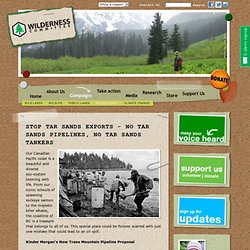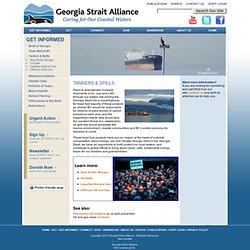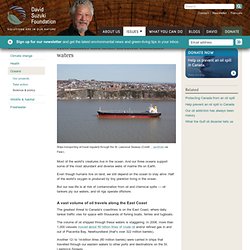

West Coast Enbridge Northern Gateway Oil Supertanker and Pipeline Project Brochure small. Stop Tar Sands Exports - No Tar Sands Pipelines, No Tar Sands Tankers. Our Canadian Pacific coast is a beautiful and diverse eco-system teeming with life.

From our iconic schools of spawning sockeye salmon to the majestic killer whales, the coastline of BC is a treasure that belongs to all of us. This special place could be forever scarred with just one mistake that could lead to an oil spill. Kinder Morgan's New Trans Mountain Pipeline Proposal For decades the Trans Mountain pipeline from Alberta has provided most of the oil we use in BC. But in 2005, Kinder Morgan bought the pipeline with the goal of transforming our inlet into a major tar sands shipping port. Very quietly in 2007, around the same time the pipeline was accidentally ruptured and leaked into the inlet, a risk assessment panel made up of industry insiders began the process of allowing bigger tankers in our waters. For more information on the proposal and on Kinder Morgan's safety track record, see our FAQ page. ArcGIS Online Map of Kinder Morgan Trans Mountain Pipeline Project View Larger Map. Georgia Strait Alliance.
Get Informed Sign Up Subscribe to "STRAIT UP" our e-news Newsletter Read "STRAIT TALK", our in-depth newsletter Plans to dramatically increase shipments of oil, coal and LNG through our waters risk turning the Georgia Strait into a superhighway for fossil fuel exports.

If these projects go ahead, BC would be responsible for millions of extra tonnes of carbon emissions each year, and the magnificent Salish Sea would face the constant threat of a catastrophic oil spill that would devastate the marine environment, coastal communities and BC’s entire economy for decades to come. These fossil fuel projects have put our region at the heart of a global conversation about energy use and climate change. Here in the Georgia Strait, we have an opportunity to both protect our local waters, and contribute to global efforts to bring about clean, safe, sustainable energy future for our children and grandchildren. See also: Information for boaters on oil spill prevention Oil and gas news archives. Oil Spill Risks. How tankers and drills threaten Canadian waters.
Ships transporting oil travel regularly through the St.

Lawrence Seaway (Credit: .: sandman via Flickr). Most of the world's creatures live in the ocean. And our three oceans support some of the most abundant and diverse webs of marine life on Earth. Even though humans live on land, we still depend on the ocean to stay alive. Half of the world's oxygen is produced by tiny plankton living in the ocean. But our sea life is at risk of contamination from oil and chemical spills — oil tankers ply our waters, and oil rigs operate offshore. A vast volume of oil travels along the East Coast The greatest threat to Canada's coastlines is on the East Coast, where daily tanker traffic vies for space with thousands of fishing boats, ferries and tugboats. The volume of oil shipped through these waters is staggering. Another 12- to 14-billion litres (80 million barrels) were carried in ships that travelled through our eastern waters to other ports and destinations on the St.
The solution?